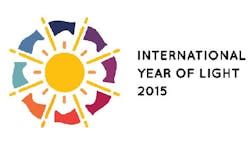Photonics community hails UN declaration of 2015 International Year of Light
IMAGE: The official logo for the 2015 International Year of Light is pictured. (Image credit: SPIE)
Bellingham, WA, Washington, DC, and Mulhouse, France--The International Society for Optics and Photonics (SPIE), the Optical Society (OSA), and the European Physical Society (EPS), among other photonics industry groups, are all hailing and commending the United Nations for officially declaring 2015 the International Year of Light and Light-Based Technologies (IYL 2015). The resolution was adopted late last week at the 68th session of the UN General Assembly in Paris.
Sponsored by the American Physical Society, the European Physical Society, the IEEE Photonics Society, the international society for optics and photonics (SPIE), the Lightsources.org international network, and the Optical Society (OSA), IYL 2015 will promote improved public and political understanding of the central role of light in the modern world and celebrate significant scientific anniversaries occurring in 2015. IYL 2015 is a cross-disciplinary educational and outreach project with more than 100 partners from more than 85 countries, accompanied by the UNESCO International Basic Sciences Program.
IYL 2015 is endorsed by a number of other international scientific unions and the International Council of Science. IYL 2015 will be administered by an International Steering Committee in collaboration with the UNESCO International Basic Sciences Program at UNESCO headquarters in Paris and a Secretariat at The Abdus Salam International Centre for Theoretical Physics, which is a UNESCO Category 1 Institute.
The IYL 2015 resolution was submitted to the United Nations Second Committee on 6 November by the nation of Mexico, with delegates from Mexico and New Zealand speaking in support, and co-sponsorship from 35 countries.
"Science expands our ability to solve the pressing challenges we face in areas important to quality of life for every person. Photonics is a crucial technology in many of those cross-disciplinary solutions as well as our ability to learn more through exploring the universe," said SPIE president-elect Philip Stahl. "The International Year of Light will help raise awareness of the possibilities inherent in light-based science and engineering, and inspire new hope in those who are still waiting for solutions to their challenges. SPIE is delighted with the United Nations proclamation and excited about this powerful opportunity to help further greater understanding of photonics." Light is more than just science and technology, Stahl noted, "It is one of the ways we experience and represent our world, through vision and the visual arts. And, it is central to how we express our deepest emotional and philosophical thoughts."
"We are grateful to the United Nations for this key decision to support the International Year of Light," said OSA CEO Elizabeth Rogan, a member of the IYL 2015 committee. "We now have a platform by which to share with the world the importance of light to science, technology, nature and culture. OSA will draw on our extensive network of members, students and volunteers to bring global attention to this valuable initiative."
The EPS notes that light is at the origin of all life, it plays a central role in human activities, and has revolutionized society through medicine and communications, entertainment and culture. Industries based on light are major economic drivers; they create jobs, and provide solutions to global challenges in energy, education, agriculture and health. Light is also important to our appreciation of art, and optical technologies are essential in understanding and preserving cultural heritage. As light becomes a key cross-cutting discipline of science in the 21st century, it is essential that its importance is fully appreciated. It is equally vital that the brightest young minds from all areas of the world continue to be attracted to careers in this field. The EPS says that an International Year of Light will raise public awareness of this essential theme, and thus support the missions and priorities of UNESCO in building capacity in education, science and technology for poverty eradication, responding to critical global social challenges, promoting universal access to information, and safeguarding culture. The study of light is accessible to all ages and all cultures; light is a tremendous subject to motivate education at all levels.
National and regional committees and contacts will ensure all nations of the world can participate. For more information, and to be placed on a mailing list for updates, please contact [email protected] Downloads are available from www.eps.org/light2015.
SOURCE: SPIE, OSA, and EPS; http://www.prweb.com/releases/2013/12/prweb11443336.htm, http://www.osa.org, and http://www.eps.org/news/106324/
